JOY: Are The Mixed Reviews A Fair Reflection Of David O. Russell’s Latest Creation?
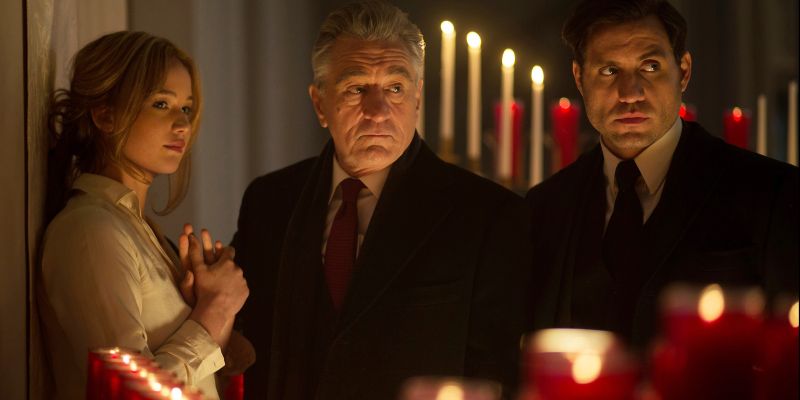
I'm a copywriter with a passion for film and screenwriting.…
Joy has certainly split the critics – but I didn’t know that when I went to see it. I like going to see films without knowing anything about them, or having any preconceptions in my mind to spoil the experience. On this occasion, I’m glad I didn’t know anything about Joy, as personally, I loved it.
Maybe it’s because I identify with many of the themes explored in the film: the tension between following your dreams and doing what’s expected of you; mother-daughter relationships; dysfunctional families (isn’t everyone’s?) to name just a few. And I’m sure a frenzied whirlwind of domesticity and relations over Christmas, versus a yearning to stretch my creativity and career aspirations as far as possible, also added to the sense of identification I felt watching Joy. Wherever the feeling of empathy came from, it inspired me to put pen to paper after reading some of Joy’s mixed reviews.
The critics’ view
To start with the positive, Robbie Collin, writing for The Telegraph loved it:
“It’s a giddy, confounding, recklessly brilliant fairy tale of self-empowerment, fuelled by the redemptive magic of the movies.”
In contrast, Justin Chang, Chief Film Critic at Variety, wasn’t so sure:
“Despite another solid performance from Jennifer Lawrence, anchoring Russell’s sincerely felt tribute to the power of a woman’s resolve in a man’s world, it’s hard not to wish Joy were better – that its various winsome parts added up to more than a flyweight product that still feels stuck in the development stage.”
Joy is loosely based on the real-life story of American Joy Mangano, the entrepreneur and inventor who created the self-wringing Miracle Mop, which became a huge success after she went on the QVC television channel to sell it. Mangano went on to create other products and became a multi-millionaire.

But Russell’s film is far from just a biopic. As we’re told at the beginning, ‘Joy is inspired by daring women everywhere, but mostly one in particular’. This could mean Mangano, but equally it could mean Jennifer Lawrence, who stars in the title role. Russell told The Guardian:
“It’s an echo of what I’ve watched Jennifer live in the last five years.”
Lawrence does it again; Russell divides opinion
Lawrence’s brilliant performance is something the critics almost universally agree on.
A.O Scott, writing in the New York Times (who gave the movie a positive review) said:
“…the movie, in all its mess and glory, belongs almost entirely to Ms Lawrence. She is the kind of movie star who turns everyone else into a character actor. This is not a complaint but an acknowledgement of both her charisma and her generosity. The rest of the cast members have the freedom to be weird, awful and lovable in spite of themselves, to orbit eccentrically around her celestial presence.”
However, some critics feel Russell, who directed the film and is credited with the story along with Annie Mumolo, hasn’t quite hit the same high mark he did with American Hustle and Silver Linings Playbook.

Alistair Ryder, writing a review of Joy for Film Inquiry said:
“With Russell’s love of quick-witted, eccentric characters, it wouldn’t be a stretch of the imagination to believe that Joy would manage to make a story about a woman inventing a new brand of mop dramatically engaging. Instead, he has made his most tedious film to date: a story with no clear reason to be given a cinematic adaptation, filled with characters who never become as interesting as Russell believes them to be.”
True, Joy doesn’t have the same zany, breathless comedic pace as American Hustle, or the heart-warming romantic journey between Jennifer Lawrence and Bradley Cooper (who also appears in Joy) of Silver Linings Playbook. I can see why people expecting more of the same from Russell may have been disappointed, but there’s still plenty to admire about Joy. It’s just different.
Self love
For a start, the film isn’t about Jennifer Lawrence’s Joy falling for Bradley Cooper’s character, QVC executive Neil Walker. It’s about Joy reconnecting and falling back in love with her dreams and ultimately, herself. Personally, I loved watching a film where a woman finds herself through her own creativity and talent, the things she found ‘joy’ in when she was a little girl, rather than the usual ‘girl meets boy and everything’s right with the world’ movie fare.
The idea of Joy being a celebration of self love, rather than romantic love, is explored throughout the film and in one moment in particular, when Joy, successfully overcoming the corruption and greed she encounters trying to start her business, walks down the street, head held high, smiling to herself. I’m a sucker for romance and Bradley Cooper any day of the week, but I loved that scene as much as I did Lawrence and Cooper dancing at the end of Silver Linings Playbook. It encapsulates that sense of ‘look out world, here I am’.
You can’t choose your family
We’re first introduced to Joy as a young girl (played by Isabella Crovetti-Cramp), proudly arranging the beautiful paper dioramas she’s made of her ideal world. As she tells her older half-sister, Peggy (played by Madison Wolfe with Elisabeth Röhm as adult Peggy), she doesn’t need a prince, because she has a special gift: the ability to make things.
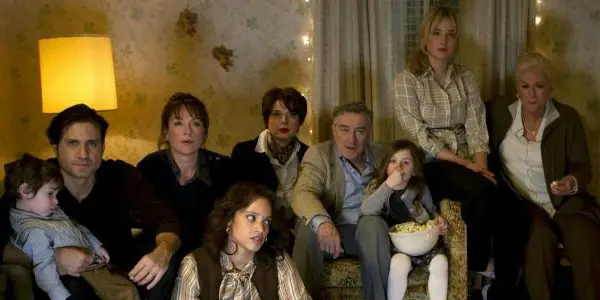
Russell told The Guardian that this scene was inspired by a real life incident when he helped Lawrence move house and ‘she opened a box of trinkets she hadn’t seen since she was six’. Joy is reminded of her childhood dioramas when she stops to look in a shop window, during her triumphant walk down the street after standing up to her adversary, underlining the fact she knows her innate creativity is back.
It’s a promising start for the young Joy, but as most of us can attest to, life rarely turns out the way we want it to – or not without a fight anyway.
When we meet adult Joy she’s struggling to make ends meet in a thankless job on an airline check-in desk, doing her best to care for her rickety house, ageing car, two children and a cast of dysfunctional family members who have somehow ended up living with her. These include her bedroom-bound, soap opera-obsessed mother Terry (played by Virginia Madsen), her volatile, three-times divorced father Rudy (played by Robert de Niro) and her crooning ex-husband Tony, who’s unsuccessfully set on being the next Tom Jones (played by Édgar Ramírez).
The exception to the dysfunction is Joy’s grandmother and number one fan Mimi (played by Diane Ladd) who does her best to encourage Joy to follow her dreams and narrates key moments in the film.
One man’s clutter is another woman’s treasure
For Jonathan Romney, reviewing the film in The Guardian, this cast of characters is too much:
“…visually, and narratively, the film feels cluttered – too many people hover with little to do, notably Virginia Madsen as Joy’s TV-addicted mother.”
Films are always a matter of opinion, but I don’t agree with Romney. Firstly, mother-daughter relationships play a huge part in the film, as does the different ‘roles’ women are expected to play in society. Joy herself is a mother, wife, daughter, granddaughter, a sister, friend, employee, carer, amateur plumber and an accountant in her father’s auto-shop business.
Without this exhausting, disorientating list of roles, I don’t think Russell would have got across the point that Joy herself is buried under the constant demands put upon her, both by her own family and society at large. Or the fact that it’s often easier to ‘stay buried’ (like her mother) rather than battle through the obstacles to become whatever you want to be. This is brilliantly illustrated in a scene where Joy is reading her daughter a book about cicadas, some of which hibernate for 17 years. Not surprisingly, Joy finds the analogy to her own life deeply disturbing and stops reading.
Joy’s rebellion; Finding the extraordinary in the ordinary
Interestingly though, Russell also explores the idea that Joy succeeds because of this adversity, rather than despite it. In Joy, the idea of the dysfunctional family isn’t just about creating comedy or drama, although there’s some of that, it’s about the subtleties.
Joy is held back by her family, illustrated by the paper dioramas she’s created as a child being trashed as her parents announce their divorce, and their relentless dependence on her, but equally, she succeeds because of them.
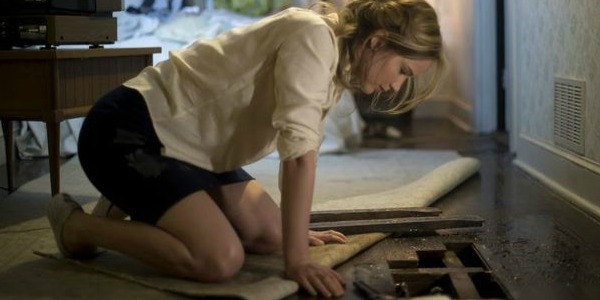
As Russell puts it, quoting Sartre:
“We only become what we are by the radical refusal of that which others have made us.” He continues: “You can wake up and find yourself defined by their space or the world’s space. And then the question is, if you’re going to try against the odds to change that.”
Joy’s mother doesn’t get her a patent for her first invention (a dog collar she invents as a young girl), dismissively saying she doesn’t know anything about patents. The dog collar goes on to be someone else’s success a few years later and it’s that childlike sense of injustice and being ignored that fires Joy up to fight for her mop patent as an adult.
Joy’s family are still with her at the end of the film, despite her father and half sister trying to sue her. She’s still caring for them, but this time it’s on her terms. Your family is your family after all, for better or worse.
In contrast to her dysfunctional relationship with her parents, is Joy’s relationship with her own children, particularly her daughter. It’s her daughter’s bedroom she goes to when the lightbulb goes off in her head and she starts to design her mop, using her daughter’s crayons and paper. From then on, it’s her daughter who’s with her, throughout the roller-coaster ride to success and it’s great to see her daughter lit up by her mother’s resolve and enthusiasm.
Maybe all these things are why Russell chose to make a film inspired by Joy Mangano in the first place, a woman who transformed her life by embracing her day-to-day experience and all her different roles (including that of mopper), rather than rejecting them in favour of doing business in a more ‘macho’ way. This theme plays out time and time again throughout the film; from Joy being inspired to rediscover her creativity and invent the Miracle Mop after cutting her hands mopping up glass; to Joy refusing to dress up as a90’s style glamourpuss to sell her mop on QVC.
She wants to go on TV just as she is, in a shirt and trousers, despite a female presenter telling her she’d never make it as a woman in a man’s world ‘looking like that’ and to show off her great legs. (The female presenter is Joan Rivers, played by her real-life daughter Melissa).
The burning question
There’s also a scene where Joy’s father’s scary new girlfriend Trudy (brilliantly played by Isabella Rossellini) asks Joy a series of questions, to decide if she’ll invest her deceased husband’s fortune in Joy’s business. The last one is:
“There is a gun on the table. The only other person in the room is an adversary in commerce. Only one of you can prevail. Do you pick up the gun?”
It’s an analogy for not backing down of course, but I love the fact that the gun Joy picks up to beat her adversaries in commerce is actually her intelligence and resolve, in contrast to their bullying and deception. She gets what she wants but she doesn’t lower herself to her adversaries’ level by destroying them.
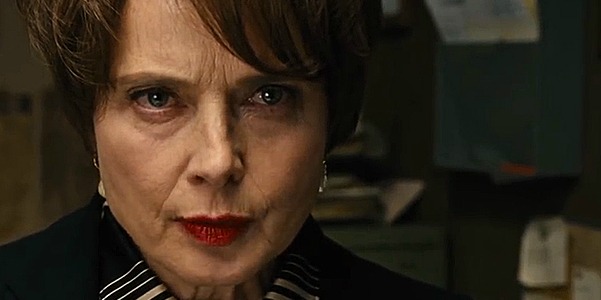
I think Russell has some fun with this, albeit in a different way to the exuberance of American Hustle. The first scene in Joy is a parody of a 1980’s style American soap opera, where one woman is encouraging another woman to ‘be strong’ and hands her a gun. In real life, Joy finds strength in herself, inspired as much by her detractors, including her self-absorbed mother, father and half-sister, as by her supporters, including her grandmother, best-friend and ex-husband.
We also find out that Joy is a brilliant shot, when she takes out her frustration at the shooting range next to her father’s auto shop. It’s both a funny scene and a reminder that Joy will pick up the ‘gun’ whenever she needs to, in terms of not taking no for an answer, or being beaten by her adversaries,whether her own family, her corrupt manufacturers or ‘macho’ capitalism at large – underlined by the refusal of a national supermarket chain to sell her mop because you’ll only ever need to buy one – it’s designed to last.
The mystery of life – according to Russell
Several reviews found the different devices Russell uses confusing, like the soap opera parody at the beginning and the storybook style narration by Joy’s grandmother. I think Justin Chang’s review for Variety has an interesting take on this:
“Russell, unspooling this rags-to-riches fable in a tone of mocking affection, riffs on two of the storytelling modes that have been historically and often disparagingly reserved for women: the fairy tale and the soap opera.”
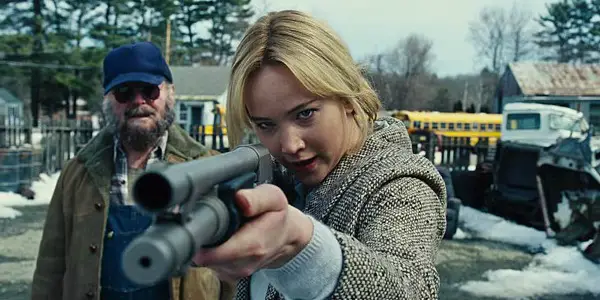
I definitely agree Russell plays with both soap opera and fairy tale throughout the film, but I also think swapping from one style of storytelling to another adds to the sense of confusion, helping us feel the sense of disorientation Joy feels at not being herself, living a life that’s not her own. In fact, many moments in the film are quite surreal, from Joy’s sleep-deprived, nightmarish dreams featuring her mother’s beloved soap opera characters, to the behind-the-scenes world of QVC, complete with revolving stage.
As Russell told The Guardian:
“I think Joy was born the unanxious presence in the room. But that’s the tricky mystery of life; you still gotta live the journey, go through the trolls and the giants and the beasts and the goblins. For some reason that’s how somebody designed the software of this place.”
In conclusion
Overall, I think Joy explores a range of interesting concepts often overlooked by films, including the idea of a ‘macho’ way of doing business where it doesn’t matter who you tread on to get to the top, versus a fairer, more supportive style, where success doesn’t come at the expense of others. This point is underlined at the end of the film, where Joy helps another young woman to create a product.
Furthermore, it explores a range of relationships not often found in cinema, including mother-daughter relationships and friendship between men and women, rather than romance. Russell makes this point through Joy’s relationship with her ex-husband Tony, who remains her biggest supporter (along with her best friend Jackie, played by Dascha Polanco) and her relationship with QVC executive Neil Walker, who remains her ‘friend in commerce’ through thick and thin.
Joy underlines the fact that a lot of what we like about films depends on how we connect with them. I liked Joy because there’s been plenty of times I’ve felt like a hibernating cicada, and found salvation in being creative, as well as motherhood and friendship. So forgive Russell for not making another American Hustle or Silver Linings Playbook and you’ll find a film with plenty to love. The mixed reviews offer some interesting insights, but I think some of them have missed the hidden gems within Joy, by comparing it to Russell’s previous films.
Robbie Collin writing in The Telegraph thinks Joy is ‘by some distance the oddest and best of the three’ and so do I.
What did you think of Joy and which side of the divide do you sit on – joyless or joyful?
Does content like this matter to you?
Become a Member and support film journalism. Unlock access to all of Film Inquiry`s great articles. Join a community of like-minded readers who are passionate about cinema - get access to our private members Network, give back to independent filmmakers, and more.
I'm a copywriter with a passion for film and screenwriting. I love most film genres but especially thrillers, science fiction, movies based on classic literature and films that can't be pigeon-holed.













